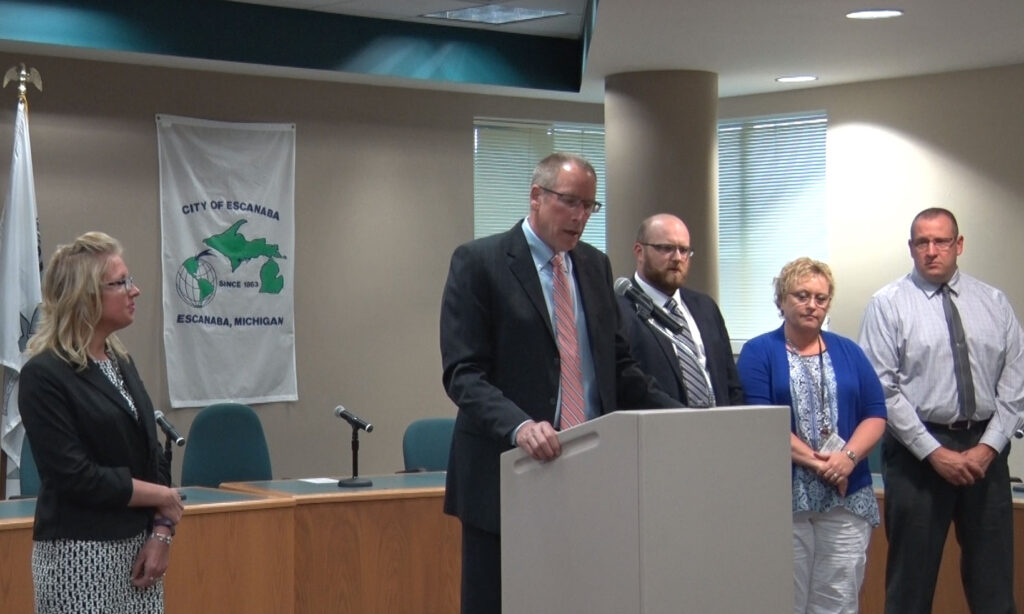Locals celebrate one year anniversary of drug court

ESCANABA — Just one year ago, Delta and Menominee counties were the only two counties in the U.P. without some sort of drug or sobriety court. Efforts to change that status and attempts to decrease the drug issue plaguing the county led to the establishment of a drug court. ABC Ten’s Chelsea Birdsall was in Delta County this morning as the court celebrated the one year anniversary.
“You can take an addict and put an addict in jail, and they’re going to get out and repeat their cycle of criminal behavior,” said Delta County District Court Judge Steven Parks. “So the concept is pretty easy – you attack the root of the problem, which is the addiction.”
And according to Judge Steven Parks, that’s exactly what drug courts do. Escanaba City Hall was jam packed this morning as the Delta County District Court celebrated its first official year with an established drug court program. After thanking his staff and various community members vital to keeping the program up and running, Judge Parks spent some time discussing the court itself.
“Drug Court in Delta County is not easy. Our target populations are high-risk, repeat offenders and they go through a screening process,” said Judge Parks. “And the word is out, that drug court is not easy and we’ve actually has people say, ‘Just send me to jail, I’d rather go to jail, I’m not going to do that,’ because they don’t want to change their lives or save their lives.”
The program lasts between 15 and 24 months and consists of four phases, all of which must be completed successfully to be recognized as a graduate. The early phases consist of rigorous supervision, multiple drug tests a week, participation in self-help programs three times a week along with regular meetings with the case manager and probation officers. And the repercussions for not completing the program are pretty serious.
“The way it works is they’re given sentences. We have a couple that are possibly facing prison sentences if they get discharged from drug court and others are looking at long stays in jail,” said Judge Parks. “It’s a carrot and stick kind of approach and it’s kind of a no brainer. It’s a chance for them to turn their life around and if they don’t turn it around, they go to jail.”
The capacity of the program is around 17, 13 of which are already occupied with one more going through the screening process. Nine of them are in phase two of the program, all of whom have demonstrated long stretches of sobriety. They all also currently have jobs and aside from one, who was arrested for a minor non-drug related offence, have remained out of jail.
In addition to Judge Parks’ remarks, a brave drug court participant took to the podium to deliver a tear-jerking speech about his battle with addiction. At just 13, Zachary Hamilton was addicted to hydrocodone and oxycodone and later experimented with marijuana and other more serious drugs, like heroin and suboxone. Hamilton spent his teenage years battling his addiction, and was ultimately arrested after public safety searched him and found drugs on his person.
“In jail, I got brought into the arraignment room. This room consisted of a cold metal bench and a television with a camera. The TV turns on and there’s Judge Parks. I feel so ashamed, scared and humiliated. ‘Mr. Hamilton, I will not be releasing you on bond. I don’t trust you anymore.’ Those words will follow me for the rest of my life. After that, I knew I had to change. The Delta County Sobriety Court has really changed me.”
After describing his road to recovery, Hamilton was given a standing ovation for his message.
“I’ve come to learn a lot of things along the way, and one of the things I’ve learn is that getting clean is hard,” said Judge Parks. “It’s really hard, harder than I ever thought as a prosecutor. Another thing I’ve learn is drug addiction corrupts hearts and souls. These were once good people that were corrupted by their addiction. And now we’re bringing that back to where they were.”
